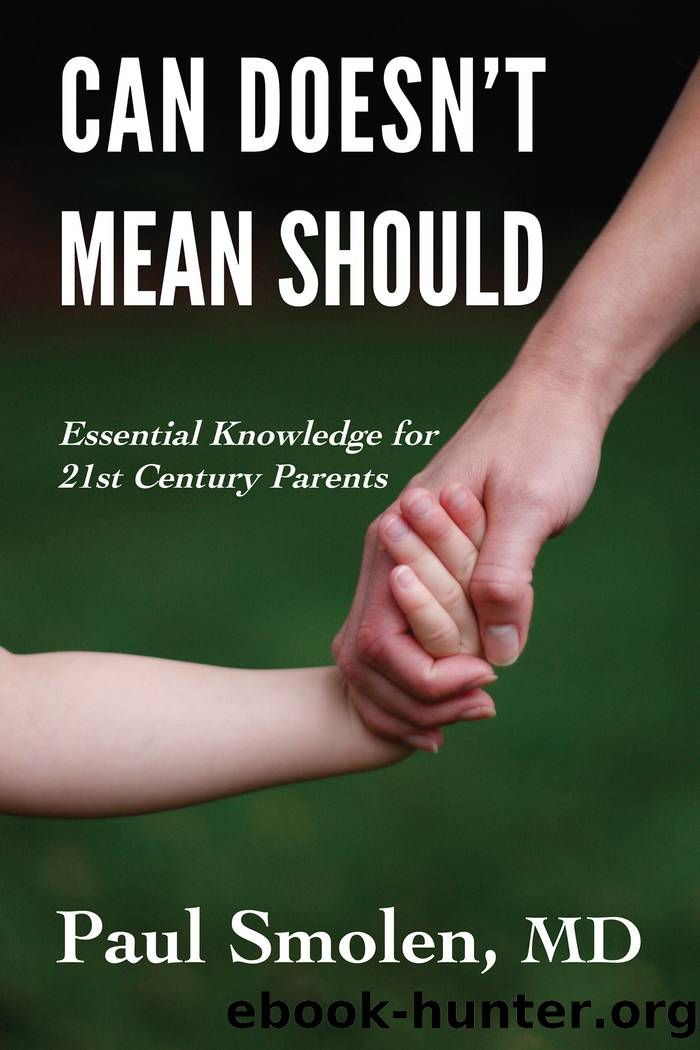Can Doesn't Mean Should by Paul Smolen MD

Author:Paul Smolen, MD
Language: eng
Format: epub
Tags: Children;can;should;Paul Smolen;pediatrician;pediatrics;nutrition;FAM010000;FAMILY & RELATIONSHIPS;Parenting;Child Rearing;JNF044000;Child Psychology;HEA048000;Diet and Nutrition
Publisher: Torchflame Books
Published: 2015-01-15T00:00:00+00:00
Successful parents are relatively strict and expect their children to achieve success at school and with peers, all in an environment that shows love and respect for the childâs individuality. Parents of successful children probably do not praise children simply to improve self-esteem. Such parents probably expect their children to perform meaningful, age-appropriate chores throughout their childhood and they follow through with negative consequences when their children fail to meet reasonable expectations.
Po Bronson and Ashley Merryman come to the same conclusions in their book, Nurture Shock.67 After analyzing the current research regarding the reinforcing of self-esteem and households saturated with parental praise, they conclude that the net effect of all this âyou are greatâ talk is to put too much pressure on childrenâto make childrenâs expectations of themselves unrealistic and negativeâthe exact opposite of what their parents intended. These authors also concluded that some criticism of children, when done in a loving way, improves overall performance on tasks and that children who are allowed to fail at things once in a while are ultimately more persistent and successful at achieving their life goals. The old saying âfailure is the best teacherâ is really true, and excessive praise of children simply insulates them from their own failures. Families that create an emotional climate that is both demanding and warm seem to raise the most successful and happy children.
Benefits of a responsible attitude in your child:
Surprisingly, I could find little research on how a child benefits from affirmatively contributing to the familyâs well being. To analyze this issue, we have to use common sense. A childâs first response to a parentâs assignment of a chore is to resist. This response is only natural. Few people accept new work and new responsibilities without some resistance. Time and patience, however, will likely cure negative attitudes.
If parents willingly and freely give of themselves to make sure the family functions well, I believe their children will eventually adopt the same attitude.
How do parents instill in their children an enjoyment of work and a willingness to be helpful to oneâs family and community? Parents consciously or unconsciously teach these attitudes to their children by example. Children learn attitudes toward work and acceptance of responsibility by imitation. If parents enjoy work and find it meaningful, their children probably will as well. If parents willingly and freely give of themselves to make sure the family functions well, I believe their children will eventually adopt the same attitude. With time and patience, when the family says, âWe need you to do this or that,â a child will hear, âThey need me.â When the family says, âWe expect you to do this or that,â a child will eventually hear âThey count on me.â When a family asks, âWill you help us do this or that,â a child feels competent, important, and needed. Children like to be needed. Initial resistance and resentment will, with time and patience, turn into pride, confidence, and a spirit of cooperation. Incorporating children into the work routines of a family is a first exposure to work.
Download
This site does not store any files on its server. We only index and link to content provided by other sites. Please contact the content providers to delete copyright contents if any and email us, we'll remove relevant links or contents immediately.
Teach Your Child How to Think by Edward De Bono(1871)
Little Soldiers by Lenora Chu(1158)
NLP For Parents by Judy Bartkowiak(989)
The Book of Virtues by William J. Bennett(912)
Happy Is the Bride by Lori Wilde(880)
Lost at School by Ross W. Greene(846)
The Enlightened College Applicant by Andrew Belasco & Dave Bergman(832)
LESSONS_IN_LOVE by Administrator(815)
The Homeschooling Handbook by Mary Griffith(806)
Living Out Loud by Anna Quindlen(765)
What to Expect the First Year by Heidi Murkoff(746)
The New Sex Bible by Jessica O'Reilly(742)
Math with Bad Drawings: Illuminating the Ideas That Shape Our Reality by Ben Orlin(722)
The Gift of Failure by Jessica Lahey(720)
Dotcom Secrets by Russell Brunson(710)
The Most Important Year by Suzanne Bouffard(705)
Weapons of Mass Instruction by John Taylor Gatto(703)
What to Expect the Second Year by Heidi Murkoff & Sharon Mazel(699)
The Physics Book by DK(688)
